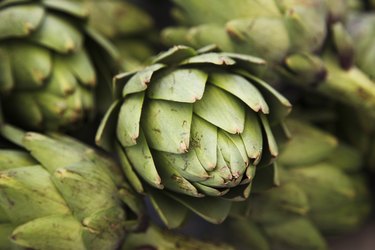
Bile is a digestive fluid the helps break fats into fatty acids that the body can absorb. Your liver produces bile from cholesterol and a byproduct of the breakdown of red blood cells called, bilirubin. Promoting the production and flow of bile helps your digestive system function optimally, keeps cholesterol levels down and helps prevent gallstones. A variety of foods can increase bile production.
Celery and Radish
Video of the Day
To stimulate bile production, Elizabeth Lipski, author of the book "Digestive Wellness for Children: How to Strengthen the Immune System," recommends celery, daikon radish, garlic, horseradish, lemon, lime, watercress and high-quality dietary oils. An eight-week study by the Department of Pharmacology, Faculty of Medicine, National University of Singapore, found that celery extract lowered total cholesterol levels in laboratory animals. It increased excretion of bile without causing any adverse side effects. The study appeared in the January 2000 issue of the journal "Life Science."
Video of the Day
Artichokes
Artichokes increase bile production and also help the liver process fats, according to naturopath and certified nutritional consultant Michelle Schoffro Cook, author of "The 4-Week Ultimate Body Detox Plan." Researchers at the Pharmacology Department, Faculty of Pharmacy, University of Seville, Spain, confirm this advice. They found that 400 mg of artichoke leaf extract significantly increased bile flow after a single dose. Artichoke leaf extract was more effective than a reference compound used in the study and known to stimulate bile flow. The researchers noted no differences in cholesterol levels from the use of artichoke leaf in this study, published in the December 2002 issue of the journal "Phytomedicine."
High-fat Diet
A high-fat diet may stimulate bile production, according to Robert Wallace, author of "Public Health and Preventive Medicine." However, health factors associated with high-fat diets may include increased risk for certain types of cancer. Fat in the large intestine can encourage the growth of bacteria, some of which produce cancer-causing toxins. Cancers of the colon, breast and prostate, which link to high-fat diets, possibly arise through this mechanism.
Fat Types
The types of dietary fats you consume may exert different influences on your gall bladder, according to a study conducted at the Department of Clinical Nutrition, Sun Yat-sen University Northern Campus, Guangzhou, China. In the laboratory animal study, published in the May 2005 issue of the journal "Lipids," saturated fat-rich diets decreased bile acids and increased blood and liver cholesterol levels, while polyunsaturated fat-rich diets increased bile acids and decreased cholesterol levels in the liver and blood.
- "Digestive Wellness for Children: How to Strengthen the Immune System...."; Elizabeth Lipski; 2008
- "Life Sciences"; The Mechanism Underlying the Hypocholesterolaemic Activity of Aqueous Celery Extract, Its Butanol and Aqueous Fractions in Genetically Hypercholesterolaemic Rico Rats; D.Tsi, et al.; January 2000
- "The 4 Week Ultimate Body Detox Plan"; Michelle Schoffro Cook; 2004
- "Phytomedicine"; Choleretic Activity and Biliary Elimination of Lipids and Bile Acids Induced by an Artichoke Leaf Extract in Rats. Saénz Rodriguez, e tal.; December 2002
- "Lipids"; Dietary Fatty Acids Regulate Cholesterol Induction of Liver Cyp7alpha1 Expression and Bile Acid Production; Y Li, et al.; May 2005
- University of Maryland Medical Center: Bile - Overview
Is this an emergency? If you are experiencing serious medical symptoms, please see the National Library of Medicine’s list of signs you need emergency medical attention or call 911.